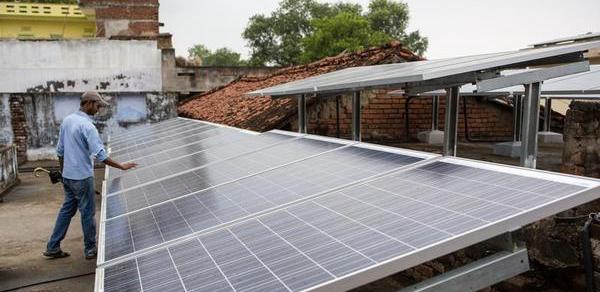Maneesh Garg and Urmila Joshi, principals of two government schools in Rajasthan, no longer complain about poor attendance even if temperature rises to 40 degree Celsius or above in the desert State.

Till recent years, attendance used to plunge in proportion to the rise in temperature. With erratic electricity supply, the situation became so bad that on some days over 50 per cent students missed school. Things have changed now, with attendance close to 100 per cent on many days during the summers, thanks partly to Finnish energy company Fortum.
As part of its corporate social responsibility (CSR), Fortum has set up solar infrastructure, including fans, in three schools in Bhilwara district. As a result, over 1,200 students get uninterrupted power supply, which also motivates them to attend classes regularly. “During the summers, it was normal to see a drop in attendance up to about 50 per cent. However, after Fortum set up the solar infrastructure, we have observed a significant improvement since the summers of 2014, with about 95 per cent attendance every day,” says Garg, the Principal of Government Secondary School at Badla (Hurda) in Bhilwara district.
Joshi, the Principal of Government Girls Sr. Higher Secondary School at Gulabpura in Bhilwara district, says: “Now we don’t have to worry about power cuts in this scorching heat.”
Activities such as CSR spending on new and renewable energy or upgrading schools or even enhancing tele-density among women, especially in rural pockets, are new for many private companies that earlier used to concentrate mainly on distributing books, providing computers or organising free health camps. The provision in the new companies Act for spending at least 2 per cent of their average net profits made in the preceding three years on CSR is helping companies find much better ways to spend.
CSR on Education
Auto-maker Maruti Suzuki is at present working in 15 schools in Gurgaon, Manesar and Rohtak in Haryana and has so far upgraded seven government schools in Gurgoan and Manesar villages, of which three have been declared the “most beautiful schools” by the State Education Department. The company plans to reach out to 34 schools by 2016-17.
In the Senior Secondary Government School, set up in 1958 in Molahera village of Gurgaon, the upgrade work included building repair, whitewash, waterproofing, fortification of boundary walls, provision of blackboards, construction of toilet, provision of water tanks, installation of fans and tube lights, provision of furniture for staff and students etc. This, it says, has attracted more students to the school.
Jodi Connection
Telecom service provider Uninor has initiated a pilot project in 87 villages of Aligarh district in western Uttar Pradesh, which involves introducing a ‘Jodi’ pack – a set of two SIM cards meant for the male member and female member of a family. It aims to enhance tele-density among women, especially in rural pockets, connect women with the world and create gender equity in mobile phone usage.
The total investment over the seven-month duration of the project is estimated at over $1.80 lakh, to which Uninor is contributing $1.13 lakh, while GSMA has granted $70,000. Within six months of the project launch, over 12,000 users have been added, of which 50 per cent are women. The pilot phase has successfully broken even within four months and now the company plans to scale up to bigger geographies.
This article was taken from here.

Pingback: Solar energy output of India is reduced significantly by air pollution – SLSV – A global media & CSR consultancy network